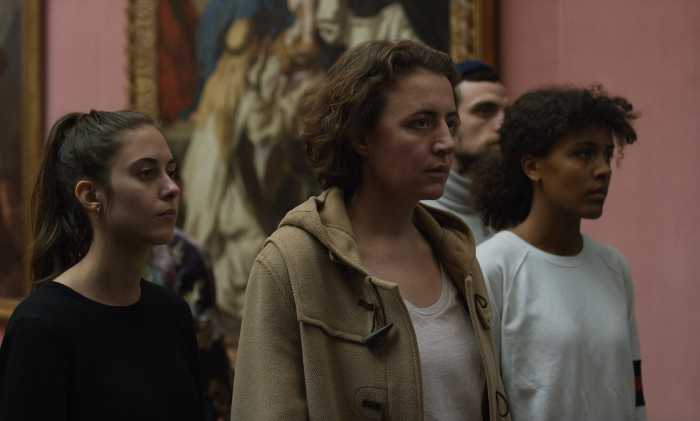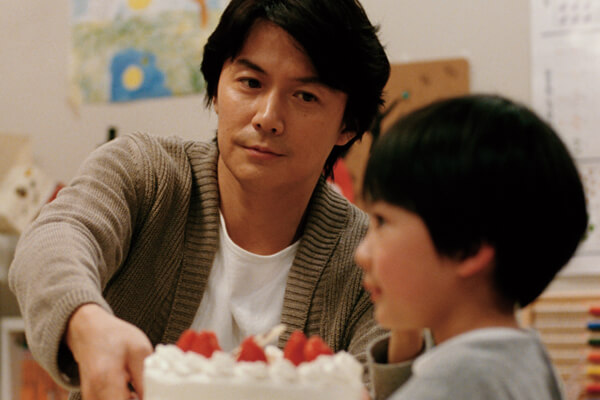Maruia Shelton, Laura Osma, and Francisco Zaldu in Lina Rodriguez’s “This Time Tomorrow.” | RAYON VERT
BY STEVE ERICKSON | When it comes to the nation of Colombia, Americans immediately think of drugs and violence. The first Colombian film I saw, “Rodrigo D.,” addresses these issues directly. Tragically, several of its teenage cast members were killed in the period between its shoot and release.
The second Colombian film I’ve seen, Lina Rodriguez’s “This Time Tomorrow,” completely dodges all stereotypes about the country and belongs to a totally different tradition of international art cinema. It seems incidental that “This Time Tomorrow” was made in Colombia, and, in fact, it was completed partially with funds from the city of Toronto, where its director now lives.
Rodriguez is speaking a kind of lingua franca — her film’s dialogue is in Spanish, but its visual language owes a great deal to the Japanese director Yasujiro Ozu and the French director Robert Bresson.
Lina Rodriguez sidesteps familiar tropes about Colombia, sexual awakening
For all its austerity, “This Time Tomorrow” has odd echoes of ‘80s American teen comedies. In large part, that’s because its narrative is pretty much driven by its family’s 17-year-old daughter Adelaida (Laura Osma). The film depicts her first grapplings with her sexuality — there’s a scene in which she discusses dildos and other sex toys with her friends, showing off a sophistication and an ability to act casually around sex that may be a bit of a pose. Her father Francisco (Francisco Zaldua) teaches art, while her mother Lena (Maruia Shelton) is a party planner, and as the film progresses they argue over her first steps into amorous and sexual experimentation. Her attitude toward her parents may be typically adolescent: she complains that they don’t give her enough freedom while she also pushes them constantly to grant her more privilege than she already has.
I think the greatest accomplishment of “This Time Tomorrow” is the degree of intimacy Rodriguez manages to achieve with her characters. Much of this stems from the fact that she obsessively films them in bed, whether or not they’re sleeping. This film is not a documentary, it never pretends to be, and it doesn’t even really ever feel like one. Nevertheless, it creates the illusion that we’re watching the interactions of a real family. Rodriguez’s concerns pick up where Ozu left off when he died in the early ‘60s. Perhaps the fact that Rodriguez now lives outside the country where she works contributes to the sense of this family’s isolation.
She learned a lot about careful sound design from Bresson. “This Time Tomorrow” is deliberately very quiet and hushed; while two songs are played during it, we only get to hear them because its characters do as well.
While Rodriguez moves the camera in most of her shots, she also uses many static shots taken from low camera angles that recall Ozu’s signature images. Her particular sense of framing and blocking is pretty distinctive and unique. “This Time Tomorrow” does not simply assume that family life or adolescent struggles can be casually depicted or that it’s easy to find a style that suits them. It dodges pretty much every cliché that comes with the material it covers, and if it ever risks seeming pretentious, the moments where it resembles an arthouse take on “Fast Times at Ridgemont High” quickly cancel that out.
As the only other critic who attended the press screening where I saw “This Time Tomorrow” pointed out, the kind of directors who have influenced Rodriguez have long been called “transcendental,” especially in an influential book by future screenwriter/ director Paul Schrader. Schrader’s ideas are now fairly contentious: many people have pointed out that Bresson’s emphasis on extremely vivid sound design and plainspoken images points instead to a materialism rather than spirituality, even if the director took on religious subjects.
But Rodriguez takes that transcendental style and points it to a totally normal middle-class family going through ordinary struggles. At the same time, it’s undeniable that “This Time Tomorrow” keeps pointing at something bigger than itself without ever spelling out what that is. It’s not exactly an overtly feminist film, but perhaps there’s an undercurrent of that ideology underneath. Rodriguez suggests that a 17-year-old girl’s arguments with her parents should be treated with the same weight Bresson brought to “Diary of a Country Priest.”
THIS TIME TOMORROW | Directed by Lina Rodriguez | Rayon Vert | In Spanish with English subtitles | Opens Aug. 4 | Metrograph | 7 Ludlow, btwn. Hester & Canal Sts. | metrograph.com



































